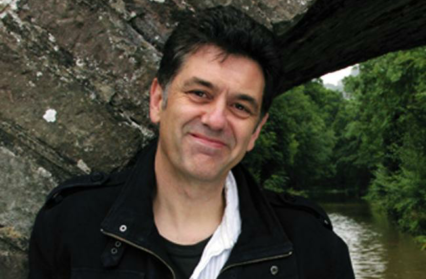Carl Griffin chats to poet and songwriter Paul Henry about how the contrasting landscapes of Wales have inspired him throughout his life.
Carl Griffin: How have the places of Wales inspired your poetry?
Paul Henry: A great deal, both physically and metaphorically. I suppose there are three, distinct locations: the Ceredigion coastline of my childhood, two Breconshire villages and then the cityscapes of Cardiff and Newport. I’ve lived on the river Usk three times. I know its birdsong and its sirens. It runs through the poems ‘Between Two Bridges’, set in Newport, and ‘Usk’, which is about moving back upstream.
The sea has become less real and more metaphorical, more ‘brittle’, in the poems about childhood. But Cardigan Bay glares at me still, out of the blank page, in at least half the poems I write. Its light is the backdrop of my voice – my cousins on the sand in Cei Newydd, my mother singing in a bay window in Aberystwyth… It’s a fusion of sea and music Wallace Stevens comes nearest to explaining in his poem ‘The Idea of Order At Key West’.
What about the grittier side of Wales, those cityscapes?
Paul Henry: Since moving back to Breconshire I’ve missed the ‘gritty’ and sometimes surreal imagery of Newport, where I brought up my three sons – rich terrain. I feel lucky to have written out of such different places.
The Brittle Sea, your New and Selected poems, is reprinted this year. What will readers discover in the New section?
Paul Henry: They’ll find some revisitations from my third book, The Milk Thief, from its sequence ‘The Visitors’. But these new poems tend to show the influence of W.S. Graham. I’d like to think they offer the reader a hint of Graham’s almost supernatural intimacy, in the way they address the second person. I’m thinking in particular of the poems ‘Penllain’, ‘Catrin Sands’ and ‘Nightingale Ann’. They’ll also find the rugby poem, ‘Steel’, and ‘Goble Montage’, an elegy for my late friend, the painter Anthony Goble.
You presented Inspired for BBC Radio Wales. What was the show about and what interesting scenarios did it bring up?
Paul Henry: The show was about how the Welsh landscape has influenced writers, artists and musicians. Abiding revelations from the three series include Coleridge’s getting told off for climbing the walls of Harlech Castle; Shelley’s Tremadoc shooting incident; Elgar’s nervous visit to Llangrannog; an interview with Gwenno Lewis, in Aberystwyth, about being the subject of Alun Lewis’s poem, ‘Goodbye’, and visiting Graham Sutherland’s favourite painting cove.
But clearest of all, from an interview with Liccy Dahl, are the small gifts, sent by readers to her late husband, which he’d preserved under a glass path in his garden, in Great Missenden.
As a songwriter, how do you know when a good line you think up is better used for a song or a poem? How do you stop the song-writing interfering with the poetry writing (or vice versa)?
Paul Henry: I’d like to think a ‘good line’ would hold its own in either a poem or a song. Years ago, I had to stop writing songs for a while. The song lyric, so easily elevated by music, seemed to undermine the more rigorous terrain of the poem. But lately I’ve been raiding my poems for lines that might work well in a song. I suppose one example, in my case, might be the poem, ‘Between Two Bridges’ and the song of the same title. The song was written after the poem and out of a couplet from the poem. Beyond that, it simply tried to stay true to the mood, tone and sentiment of its poetic source. I used the same approach with ‘The Drunk and the Nightrunner’. They’re easy with each other these days, the poems and the songs.
As your children, and other family members, have aged, how have the changes you have noticed within them changed your poetry (as in ‘Daylight Robbery’ compared to more recent work)?
Paul Henry: The ten year gap between the child of ‘Daylight Robbery’ and the adult of ‘The Black Guitar’ hopefully charts a growth in formal technique. And I hope The Brittle Sea confirms this. As for my three sons, they’re men now. But they’re still at the heart of my next collection.
Excusing Private Godfrey, Paul Henry’s tribute to the playwright and actor Arnold Ridley, was recently broadcast on BBC Radio 4.
You might also like…
Sophie Baggot reviews Paul Henry’s tenth poetry book, The Glass Aisle, and highlights its inspiration from centuries of Welsh history.












